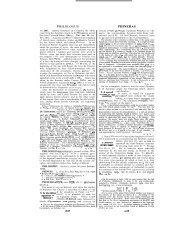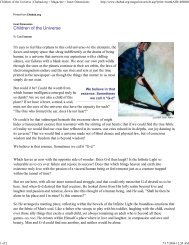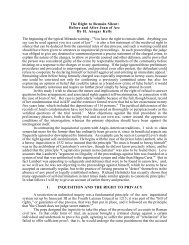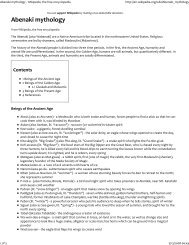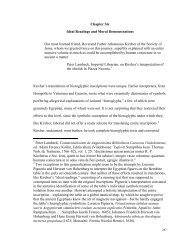sefi;g:v. - A Kabbalist walks into a bar, and the
sefi;g:v. - A Kabbalist walks into a bar, and the
sefi;g:v. - A Kabbalist walks into a bar, and the
Create successful ePaper yourself
Turn your PDF publications into a flip-book with our unique Google optimized e-Paper software.
SELEUCIDA SEILEUCIDA<br />
Pelusium <strong>and</strong> of <strong>the</strong> isl<strong>and</strong> of Cyprus which was now<br />
practically his through <strong>the</strong> treachery of Ptolemy Macron<br />
(2 Macc. loI3). Antiochus' victorious career in Egypt<br />
came to an abrupt ending. For at this moment <strong>the</strong><br />
Roman victory at Pydna (168 B.C.) changed <strong>the</strong> whole<br />
face of affairs in <strong>the</strong> East.<br />
Popilius knas, <strong>the</strong> Roman envoy, a harsh, rude man,<br />
dem<strong>and</strong>ed in <strong>the</strong> name of <strong>the</strong> senate that Antiochus should<br />
restore his conquests <strong>and</strong> evacuate Egypt within a set term.<br />
Antiochus asked time for consideration; hut <strong>the</strong> envoy drew<br />
with his staff a circle round <strong>the</strong> king <strong>and</strong> hade him answer<br />
before he stepped beyond it (Pol. 29 27, Livy4512). Antiochus<br />
yielded. ' Like Macedonia in <strong>the</strong> war just waged by Perseus,<br />
<strong>the</strong> Seleucida had made in <strong>the</strong> war regarding Cotlesyria a final<br />
effort to recover <strong>the</strong>ir earlier power; hut it is a significant<br />
indica ion of <strong>the</strong> difference between <strong>the</strong> two kingdoms, that in<br />
<strong>the</strong> former case <strong>the</strong> legions, in <strong>the</strong> latter <strong>the</strong> abrupt language of<br />
a diplomatist, decided <strong>the</strong> controversy' (Momms. Hist. ofRome,<br />
2 309).<br />
It was upon his return to Syria after finding <strong>the</strong> prize<br />
of Egypt, so nearly within his grasp, thus forever snatched<br />
from him, that Antiochus committed those outrages in<br />
Palestine which earned him <strong>the</strong> undying hatred of <strong>the</strong><br />
Jews, <strong>and</strong> for which he is pilloried in <strong>the</strong> books of Daniel<br />
<strong>and</strong> Maccabees as <strong>the</strong> very personification of impiety.<br />
Already upon his first return, in 170 B.c., he had<br />
captured Jerusalem, slain <strong>and</strong> enslaved thous<strong>and</strong>s of<br />
Jews, entered <strong>the</strong> Holy of Holies, <strong>and</strong> despoiled <strong>the</strong><br />
temple (I Macc. 1 ZOJ 2 Macc. 5 1.3 ; see ANTIOCHUS 2,<br />
JASON, MENELAUS). Now <strong>the</strong> king determined to<br />
carry through <strong>the</strong> Hellenisation of Palestine. A royal<br />
edict made <strong>the</strong> practice of Jewish rites punishable by<br />
death; <strong>the</strong> temple was dedicated to Zeus Olympios<br />
(168 B.C. See I Macc. 141J, 2 Macc. 61J).l These<br />
persecutions led to <strong>the</strong> revolt of <strong>the</strong> Maccabees. The<br />
outbreak of Mattathias at Modin (167 B.C.) seems to<br />
have attracted little attention at <strong>the</strong> capital. It was not<br />
until <strong>the</strong> death of Mattathias <strong>and</strong> <strong>the</strong> assumption of<br />
leadership of <strong>the</strong> movement by his son Judas (166 B. c. ),<br />
who defeated several detachments (that of Apollonius,<br />
I M~cc, 310 ; that of Seron, I Macc. 313), that ' his<br />
name came near even unto <strong>the</strong> king,' <strong>and</strong> energetic<br />
measures were taken to suppress <strong>the</strong> insurrection<br />
(I Macc. 327). The general conduct of Yhe operations<br />
was entrusted to LYSIAS (q.~.). 'an honourable man,<br />
<strong>and</strong> one of <strong>the</strong> seed royal' (I Macc. 332); but <strong>the</strong><br />
victories of Judas at Emmaus <strong>and</strong> Beth-zur secured <strong>the</strong><br />
practical evacuation of <strong>the</strong> country, <strong>and</strong> gave opportunity<br />
for <strong>the</strong> purification <strong>and</strong> rededication of <strong>the</strong> Temple<br />
(I Macc. 436f:, 2 Macc. 101J). Antiochus was unable<br />
apparently to direct upon Judea <strong>the</strong> whole force of <strong>the</strong><br />
empire, before which <strong>the</strong> Jewish national party must<br />
undoubtedly have succumbed. He was engaged<br />
beyond <strong>the</strong> Euphrates (I Macc. 337), not, as <strong>the</strong> Jewish<br />
narrative puts it, to 'take <strong>the</strong> tributes of <strong>the</strong> countries,<br />
<strong>and</strong> to ga<strong>the</strong>r much money' (I Macc.331). hut more<br />
probably in safe-guarding his frontiers against <strong>the</strong> growing<br />
power of <strong>the</strong> Parthians (cp Tac. Hist. 58 : 'rex<br />
Antiochus demere superstitionem et mores Grzecorum<br />
dare adnisus. quominus tzeterrimani gentem in rnelius<br />
mntaret, Parthorum bello prohibitus est ').<br />
The sequence <strong>and</strong> extent of his operations in this quarter are<br />
unknown. After making an attempt to plunder a temple of<br />
Artemis in ELYMAIS (q.~., see also NANEA), Antiochus died of<br />
disease at Tab= in Persia; some said that he died mad (Pol.<br />
31 11. Appian, SPY.<br />
66); <strong>the</strong> professedlycircumstantial narratives<br />
of I Macc. 6 13 <strong>and</strong> 2 Macc. 9 ~ f: are mutually contradictory<br />
<strong>and</strong> of no historical value (cp in general MACCABEES, FIRST,<br />
f IO, SECOND, Fi 2.L). When, ii fact, we compare <strong>the</strong> last episode<br />
of this king's life with that of his fa<strong>the</strong>r, we may well doubt<br />
whe<strong>the</strong>r <strong>the</strong> tradition is not a confusion partly suggested by <strong>and</strong><br />
founded upon <strong>the</strong> nickname Epimanes applied to Antiochus IV.<br />
Wilcken, S.V. ' Antiochus ' in Pauly's Realencyc., ed. Wissowa),<br />
or only two (so 2 Macc. 5 I ; see Mahaffy, Em#. of UePioltmies,<br />
3363). His usurpation of Egypt was marked by <strong>the</strong> Seleucid<br />
anchor on <strong>the</strong> copper coins, <strong>and</strong> also by a new issue of copper<br />
coins with his own name.<br />
1 Perhaps <strong>the</strong> savage outbreak at Jerusalem upon <strong>the</strong> second<br />
occasion was +e to pome more personal grievance than mere<br />
resistance to innovations. The nationalists of Palestine may<br />
have heen in part responsible for <strong>the</strong> delay <strong>and</strong> failure of his<br />
Egyptia expedition, as Mahaffy suggests, og. cif. 341.<br />
4353<br />
~<br />
Antiochus V., Eupator (164-162 B.c.), son of <strong>the</strong><br />
preceding, was ei<strong>the</strong>r nine or eleven years'old at his<br />
antiochus fa<strong>the</strong>r's death (Appian, Syr. 46 ; Eus.<br />
v. (164-162 Chr. 1253). In 166 B.C. Antiochus<br />
- ",<br />
Epiphanes, on <strong>the</strong> eve of his departure<br />
D.V.).<br />
to- <strong>the</strong> east, appointed Lysias -' to be<br />
over <strong>the</strong> affairs of <strong>the</strong> king from <strong>the</strong> river Euphrates<br />
unto <strong>the</strong> borders of Egypt, <strong>and</strong> to bring up his son<br />
Antiochus, until he came again ' (I Macc. 332J ) ; see<br />
LYSIAS. On <strong>the</strong> death of Antiochus Epiphanes, Lysias<br />
declared Antiochus his son king, with <strong>the</strong> title Eupator,<br />
' on account of <strong>the</strong> virtues of his fa<strong>the</strong>r ' (I Macc. 6 17;<br />
cp Appian, Syr. 46). The young king <strong>and</strong> his guardian<br />
<strong>the</strong>n led an expedition to <strong>the</strong> relief of Jerusalem, where<br />
<strong>the</strong> citadel was hard pressed by Judas Maccabzeus.<br />
The armies met at Beth-zacharias, near Beth-zur, <strong>and</strong><br />
Judas was defeated <strong>and</strong> his bro<strong>the</strong>r Eleazar slain<br />
(I Macc. 6&$, Jos. Ant. xii. 94 ; but 2 Macc. 13165,<br />
representing <strong>the</strong> Jews as victorious, is clearly unhistorical).<br />
The victory of Antiochus enabled him to<br />
invest Jerusalem (I Macc. 6 48J ), <strong>and</strong> famine was already<br />
doing its work when <strong>the</strong> king's troops were recalled by<br />
<strong>the</strong> news that Philip, <strong>the</strong> foster-bro<strong>the</strong>r of Antiochus<br />
Epiphanes (z Macc. 9zg), was approaching Antioch<br />
with an army (I Macc. 6551.). Philip had, in fact,<br />
been appointed by <strong>the</strong> dying Epiphanes as guardian of<br />
<strong>the</strong> young Antiochus (I Macc. 655). Peace was made<br />
with <strong>the</strong> Jews on <strong>the</strong> terms that ' <strong>the</strong>y shall walk after<br />
<strong>the</strong>ir own laws, as aforetime' (I Macc. 659 ; 2 Macc.<br />
1323); but Antiochus in spite of this destroyed <strong>the</strong><br />
fortifications of <strong>the</strong> city <strong>and</strong> imprisoned <strong>the</strong> high priest<br />
(I Macc. 662, Jos. Ant. xii. 97). Returning to Syria,<br />
he found no difficulty in expelling Philip from Antioch<br />
(I Macc. 663). In 162 B.c. Antiochus himself was<br />
betrayed, along with Lysias, <strong>into</strong> <strong>the</strong> h<strong>and</strong>s of Demetrius,<br />
<strong>the</strong> son of Seleucus, <strong>and</strong> rightful heir to <strong>the</strong> Syrian<br />
throne, <strong>and</strong> was by him put to death (I Macc. 723, 2 Macc. 14 I$, Polyb.31 I ~ J .<br />
See ANTIOCHUS, 3.<br />
Jos. Ant. xii. 1015).<br />
Demetrius I., Soter (162-150 B. c. ), son of Seleucus<br />
IV. Philopator.<br />
As a boy he had been sent in 175 B.C. to take hisuncle's place<br />
as a hostage in Rome (Polyb. 31 12, I Macc. 1 IO). When his<br />
cousin inherited <strong>the</strong> crown which his fa<strong>the</strong>r<br />
11. Demetrius I. Epiphanes had usurped Demetrius who<br />
(162-160 B.G.). had <strong>the</strong>n lived nearly twelve years'prac-<br />
tically a state prisoner in Italy, begged <strong>the</strong><br />
Roman Senate to recognise his claim to <strong>the</strong> Syrian throne, hut<br />
In vain. It suited <strong>the</strong> Senate better that a mere boy should rule,<br />
ra<strong>the</strong>r than one who had reached his twenty-third year. At last<br />
he made his escape in a Carthaginian vessel <strong>and</strong> l<strong>and</strong>ed in Syria<br />
os. Ant. xii. 10 I, z Macc. 14 I). There seems no ground for<br />
:le opinion that <strong>the</strong> Senate really connived at his escape (so<br />
Holm, Grk. Hist. 4 416 ET).<br />
After putting to death Antiochus V. <strong>and</strong> Lysias (see<br />
above), <strong>the</strong> first object of Demetrius was to gain <strong>the</strong><br />
recognition of <strong>the</strong> senate (Polyb. 324J, Diod. 31 29).<br />
It was only after a long time that he gained <strong>the</strong> grudg-<br />
ing <strong>and</strong> half-hearted recognition he sought. Timar-<br />
chus, who nnder Antiochus Epiphanes had been satrap<br />
of Babylon (Appian, Syr. 47), revolted, <strong>and</strong> declared<br />
himself king, <strong>and</strong> ruled Babylon with an iron h<strong>and</strong>.<br />
Him Demetrius put down, being given for this service<br />
his title Soter ( ' Saviour ') hy <strong>the</strong> grateful Babylonians.<br />
The relations of Demetrius with <strong>the</strong> Jews are sufficiently<br />
set forth elsewhere (DEMETRIUS, I, <strong>and</strong> in <strong>the</strong> references<br />
<strong>the</strong>re given).<br />
The foreign policy of Demetrius was not skilful :<br />
indeed it is difficult to see <strong>the</strong> object at which he aimed.<br />
First, he attempted to get his sister Laodice, <strong>the</strong> widow<br />
of Perseus, married to Ariara<strong>the</strong>s 1'. of Cappadocia,<br />
possibly in order to form an anti-Roman league in <strong>the</strong><br />
east. Failing in this, he married her himself, <strong>and</strong> in<br />
revenge encouraged a claimant to <strong>the</strong> Cappadocian<br />
throne in <strong>the</strong> person of Orophernes, bro<strong>the</strong>r of Ariara<strong>the</strong>s<br />
(Polyb. 3224). The only result was to raise against<br />
Demetrius <strong>the</strong> enmity of both Rome <strong>and</strong> Attalus of<br />
Pergamum (Polyb. 35). Attalus 11. in return supported<br />
<strong>the</strong> claims of a pretender, Alex<strong>and</strong>er Bala, or Balas, to<br />
4354



